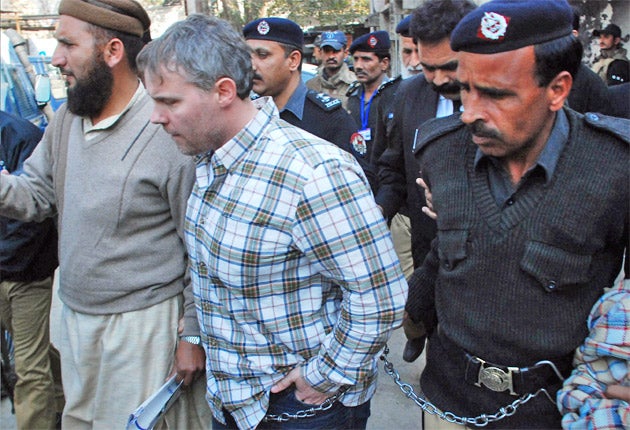Pakistan frees CIA contractor after 'blood money' deal

One of the biggest crises between Pakistan and the United States has been defused after a Lahore court released Raymond Davis, a CIA contractor facing charges of double murder, after a blood-money settlement was paid to families of the victims.
While the release of Mr Davis cools tensions, after plunging relations to a low point, it is likely to inflame an already enraged Pakistani public and media. Islamist parties took to the streets in protest last night.
Each of the two men's families were paid $700,000 (£437,000) by the CIA, senior Pakistani officials told The Independent. Under Pakistan's laws, a Sharia-based provision allows the families of murder victims to forgive the accused in exchange for monetary compensation. The "blood money" laws have been invoked in a majority of murder cases in Pakistan.
The arrangement was the result of lengthy direct negotiations between the Pakistani Inter-Services Intelligence (ISI) and the CIA. Last night, the US Secretary of State, Hillary Clinton, denied that the American government had paid the money.
Mr Davis was a CIA contractor working in Pakistan without the ISI's authorisation, spying on the banned Pakistani militant outfit Lashkar-e-Taiba, an anti-Indian group that is held responsible for the November 2008 Mumbai attacks.
The blood money formula was first devised by Husain Haqqani, Pakistan's ambassador to the US, who is well versed in Islamic law. He discussed the proposal with US Senator John Kerry, who subsequently took it with him for discussions with Pakistani leaders. In late February, the CIA and the ISI opened direct negotiations with each other, discussing how to reach a settlement. By circumventing the issue of diplomatic immunity, the blood-money formula helped the Pakistani government to save face, said Pakistani officials.
Washington had always said Mr Davis enjoyed immunity from prosecution under the Vienna Convention. The Lahore court disputed this, ruling last week that he had no immunity.
The victims of the families were persuaded to accept the compensation by the ISI, said a senior Pakistani official. Some family members had earlier said they refused to accept compensation. By getting them to do otherwise, the Pakistan government was able to see through its insistence that Pakistani courts be used to settle the matter. The Punjab provincial government was on board.
Amid the negotiations, the ISI was also able to secure an unprecedented two-year extension for its chief, Lieutenant-General Ahmed Shuja Pasha. The message to the civilian government, which had already given army chief General Ashfaq Kayani a three-year extension, was that it would not be prudent to switch spy chiefs during such a crisis. General Pasha had been due to retire in two days.
The Saudis were also approached to play a mediatory role, but refused to do so, a senior Pakistani official said. It was hoped they could cool tensions between the CIA and ISI, ask the religious right which has been demonstrating on the streets to relax, and urge the Punjab government headed by the brother of former prime minister Nawaz Sharif, a key Saudi ally, to co-operate.
Mr Davis is a former special-forces soldier who had worked with Blackwater in Iraq, and arrived in Pakistan in October 2009. The role of contractors in Pakistan was at the heart of the dispute between the CIA and the ISI. It is unclear whether the ISI was able to secure its demand that the CIA withdraw all contractors from Pakistan.
The contractors are a part of the CIA's vast covert war inside Pakistan. Though it protests in public, Pakistan has quietly allowed the CIA to routinely fire drone missiles targeting militants in the tribal areas along the Afghan border. But the agencies clashed over the use of contractors who were spying on militant outfits known to have longstanding ties with the ISI.
Join our commenting forum
Join thought-provoking conversations, follow other Independent readers and see their replies
Comments